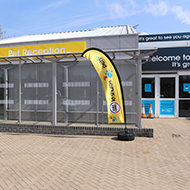Eurotunnel launches new pet reception

Pet owners are estimated to represent around 10 per cent of shuttle customers.
Eurotunnel has opened a new reception area for pets and their owners to relax before travelling to France.
Located in the Victor Hugo passenger building on the UK terminal, the new space will enable staff to carry out regulatory documentary checks required by the European Union (EU).
Since the end of the Brexit transition period (January 1), passengers travelling to the EU with their pets (cats, dogs, ferrets) must provide proof of their animal’s identity and show a vaccination passport.
With pet owners estimated to represent around 10 per cent of shuttle customers, Eurotunnel wanted to provide a comfortable area where such checks could occur before departure to France, rather than on arrival.
They accomplished this through an agreement reached in January between Getlink, the French General Directorate of Customs and Indirect Rights (DGDDI) and the French General Directorate of Food (DGAL).
The agreement specifies that Eurotunnel’s specially-trained Pet Reception staff may conduct the checks required by the EU, while French Customs services based on the British terminal may carry out additional random checks and controls on behalf of DGAL.
To be allowed access to the EU, animals must be at least 12 weeks old and hold a European Union Pet Passport or an Animal Health Certificate issued by a vet in the UK less than 10 days before departure. Pet travellers must have also been vaccinated against rabies (12 weeks +) and at least 21 days before travel.
“Travel restrictions have not slowed down the work and improvements carried out for the comfort and quality of service we want to offer our customers,” commented Yann Leriche, CEO of Getlink.
“Each year, more than 300,000 of them cross with a dog or a cat aboard our Shuttles. When traffic is back to normal, everyone will appreciate being able to go to France with their animal, with the peace of mind that they can drive straight off a Shuttle onto the motorway.”



 RCVS Knowledge has called on vet practices to audit their post-operative neutering outcomes.
RCVS Knowledge has called on vet practices to audit their post-operative neutering outcomes.